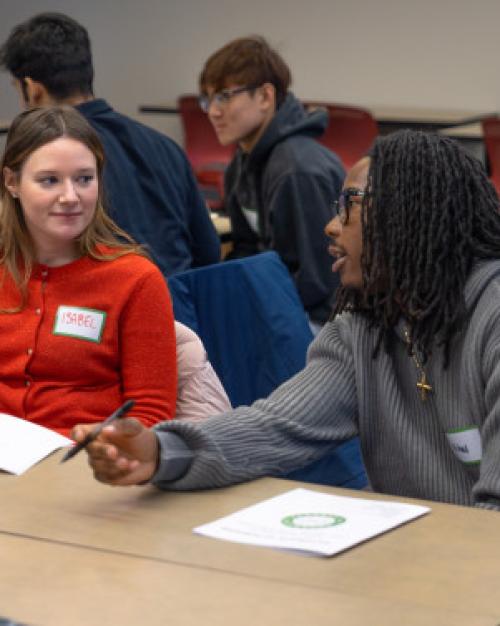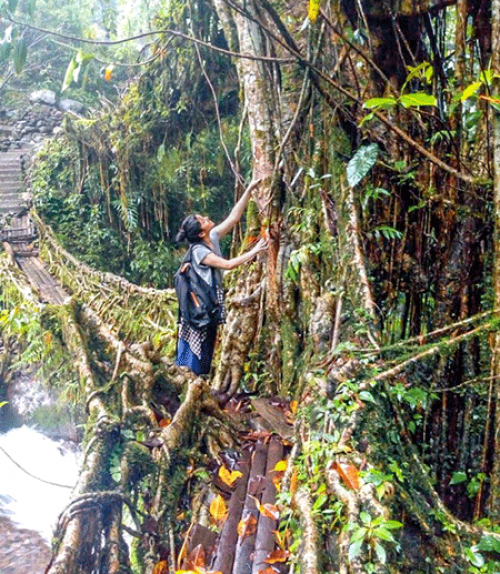Aparajita Majumdar, Ph.D. candidate in the field of history, spent six hours last summer hiking through the Khasi hills of eastern India to find one of the region’s famed living root bridges.
Ana Ozaki, Ph.D. candidate in the field of history of architecture and urban development, befriended her cab driver in Maputo, Mozambique, while investigating how race and climate meet in that country’s architecture.
Both students conducted summer international research critical to their dissertations through the 2019 Einaudi-SSRC Dissertation Proposal Development Program. This year, the 16 Ph.D. students in the cohort are refining their dissertation plans with help from faculty mentors and intensive workshops, while adapting to unforeseen obstacles created by the global pandemic.
Now in its fourth year, the Einaudi-SSRC program – sponsored by the Mario Einaudi Center for International Studies, with additional funding from the Social Science Research Council – provides professional development and fieldwork support of up to $5,000. This year, the program takes its theme from Cornell’s Global Grand Challenge: Migrations – an irony not lost on students who had hoped to spend the summer traveling to far-flung places like Mongolia, Bolivia and Indonesia.
Participants’ travel has been postponed until winter break – but this year’s Einaudi-SSRC students are finding ways to collaborate internationally and adapt to fieldwork delays. The program’s usual timeline has been pushed back, with major workshops held before and after international research now scheduled for November and February. Several students are launching their research remotely, through video conferences and online resources.
This year’s awardees:
• Tuvshinzaya Amarzaya (design and environmental analysis): affordable housing and cultural integration for Mongolian migrants;
• Aman Banerji (development sociology): speculative capitalism and rural dispossession in Karnataka, India;
• Chelsea Butkowski (communication): Election Day social media in the U.S. and Netherlands;
• Michael Cary (development sociology): wildfire impacts on social inequality in Bolivia;
• Hannah Cole (comparative literature); human and plant diasporas in the Caribbean;
• Daniel Dawson (history): African mobility and resistance in the early modern Spanish Caribbean;
• Tiên-Dung Hà (science and technology studies): national genome projects and the politics of migration in Southeast Asia;
• Kanika Khanna (government): planning racial residential integration in U.S. cities;
• Astara Light (history of art, visual studies, and archaeology): Indonesian visual media in the international art market;
• Sarah Meiners (history): child refugees and Cold War-era U.S. asylum politics;
• Michael Miller (history): religion and masculinity in Dutch colonial Indonesia;
• Emilio Ocampo Eibenschutz, (history): 19th-century slave trade in Western Indian Ocean;
• Connor Rechtzigel (anthropology): marketing halal tourism in Lombok, Indonesia;
• Ecem Saricayir (architecture): built environment and resettlements in Transcaucasia;
• Juhwan Seo (sociology): same-sex couples and the marriage green card in the U.S.; and
• Alice Wolff (medieval studies): changing climate and cuisine in first-millennium Europe.
Majumdar – who last year trekked through India to research how the rubber tree enables literal and figurative bridge-building in indigenous communities – said she particularly benefited from the workshops with faculty mentors, which gave her perspective on the review process for graduate grants.
She was able to build on her success in the Einaudi-SSRC program by applying for additional funding from SSRC. Majumdar was one of 70 from across the country selected for the Mellon International Dissertation Research Fellowship. The fellowship provides a full year of support to Ph.D. candidates working on international dissertations in the humanities and social sciences.
Durba Ghosh, professor of history in the College of Arts and Sciences and one of the program’s co-leaders, is excited to see how the new cohort will respond to the current challenges.
“Like many programs,” Ghosh said, “we changed our schedule to work around this semester’s disruption, but we’re confident that the program’s workshops will keep us going as we figure out how we all move forward with international research.”
The Einaudi-SSRC program also is supported by the Graduate School, the College of Arts and Sciences, and the College of Agriculture and Life Sciences.
Priya Pradhan ’22 is a writing intern at the Mario Einaudi Center for International Studies. Sheri Englund is associate director of communication for Global Cornell.
Read the story in the Cornell Chronicle.




